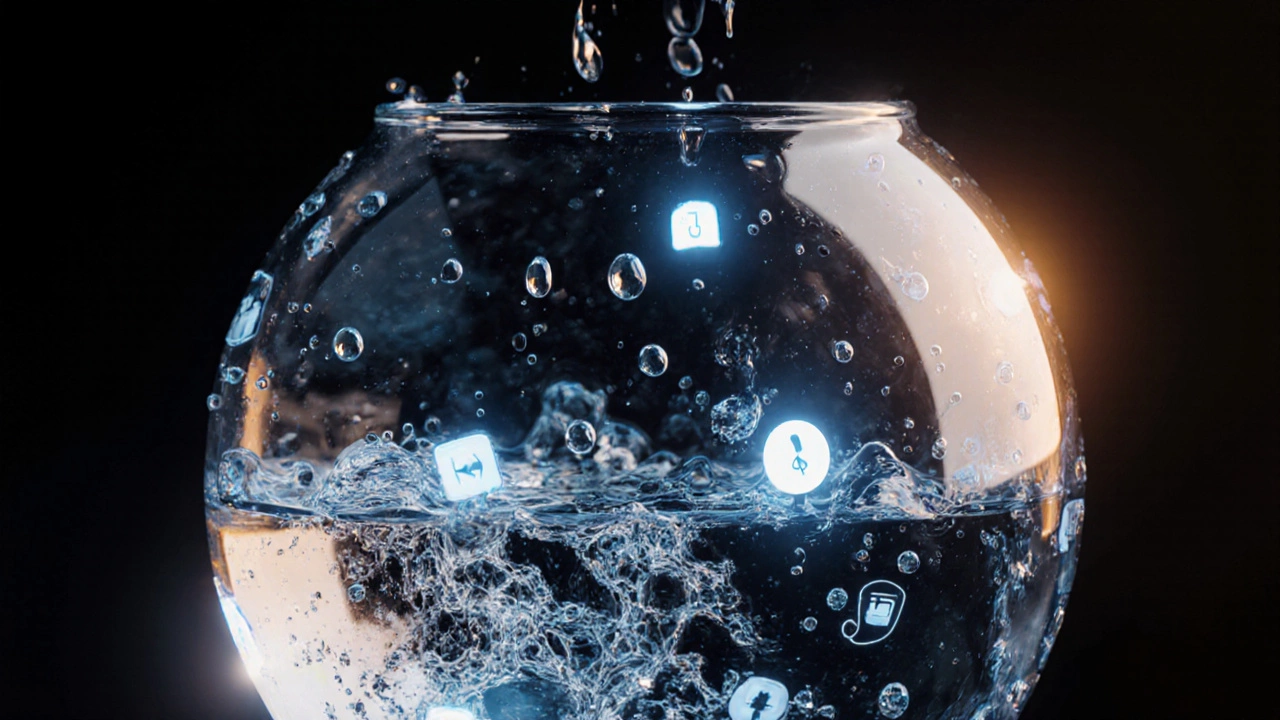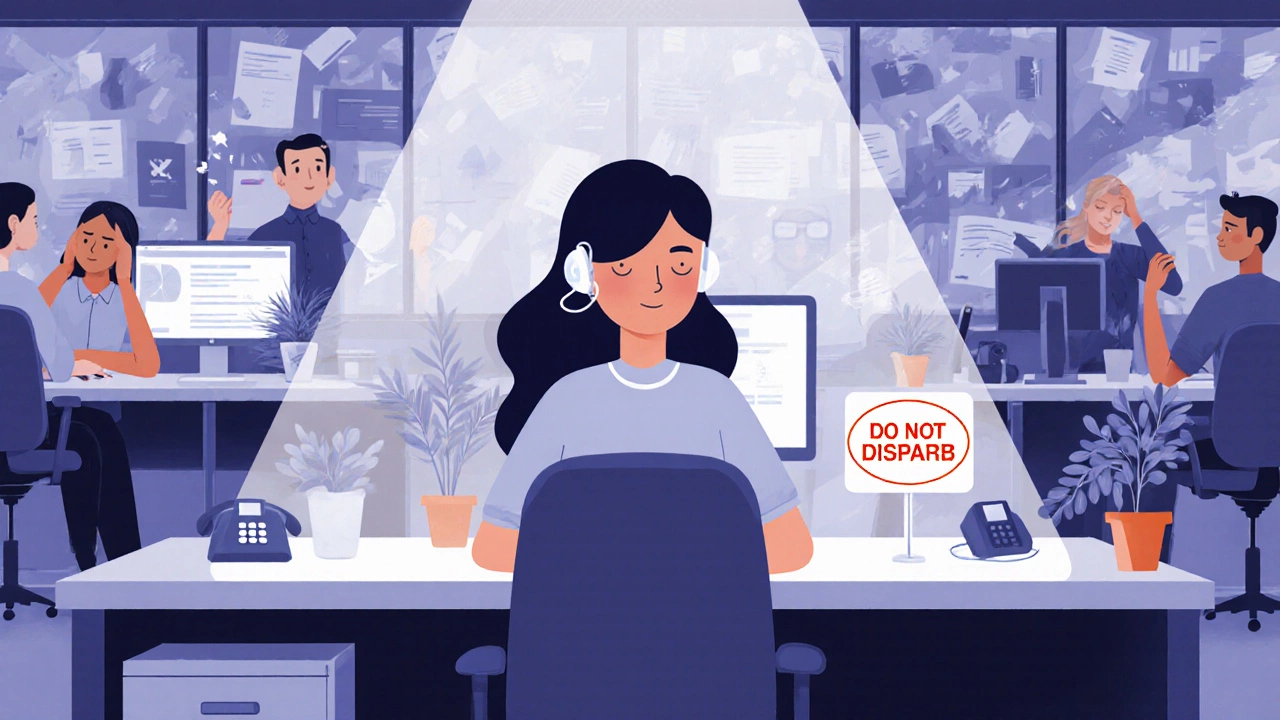Sensory Overload Calculator
This tool helps you understand how your daily activities contribute to sensory overload based on your personality type. Complete the assessment to see your personal score and get tailored recommendations.
Your Current Sensory Load
Personalized Recommendation: You've got excellent sensory management! Keep up your current routines and boundaries.
How It Works
Sensory overload happens when small stressors accumulate over time, like filling a glass drop by drop until it overflows. This calculator helps you understand how your daily activities contribute to your sensory load. Each category has a score value that adds up to your total.
Select Your Triggers
Social Interactions
Environmental Factors
Decision Making
Emotional Load
Ever feel like the world is just too much? The noise, the emails, the social plans, the endless to-do lists - it all piles up until you just want to hide under the covers? You’re not broken. You’re not lazy. You’re probably one of the many people whose personality type makes them deeply sensitive to stimulation - and that’s completely normal.
Highly Sensitive People (HSPs) Are the Most Likely to Get Overwhelmed
If you’re easily overwhelmed, the most likely reason is that you’re a Highly Sensitive Person. This isn’t a disorder. It’s a trait, scientifically studied since the 1990s by psychologist Dr. Elaine Aron. About 15-20% of the population has this trait. HSPs process sensory data more deeply. Their brains don’t filter out background noise the way others do. That means a crowded room doesn’t just feel busy - it feels like a fire alarm going off inside their skull.
It’s not just about being shy or introverted. An HSP can be outgoing, talkative, even extroverted - but still get drained after a long day of meetings, phone calls, or even small talk. Why? Because their nervous system doesn’t turn off. They feel everything: the tone of a voice, the flicker of fluorescent lights, the unspoken tension in a room. And that takes energy. A lot of it.
Introverts Often Overwhelm Themselves Trying to Be Extroverts
Introverts don’t get overwhelmed because they’re shy. They get overwhelmed because social interaction, even enjoyable ones, drains their energy faster than it does for extroverts. That’s not a flaw. It’s biology. Introverts’ brains respond differently to dopamine - the chemical linked to reward and excitement. Too much social stimulation floods their system. They don’t need less people; they need more recovery time.
Here’s what happens in real life: An introvert says yes to a work happy hour, then a friend’s birthday dinner, then a weekend brunch. By Tuesday, they’re exhausted, irritable, and can’t focus. They didn’t do anything wrong. They just didn’t account for their energy limits. Many introverts push through because they feel guilty saying no. But that guilt? It’s the real culprit.
Empaths Are Emotional Sponges
If you absorb other people’s moods like a sponge, you’re likely an empath. Empaths don’t just feel their own emotions - they feel others’ as if they’re their own. A coworker’s stress becomes your headache. A stranger’s sadness in line at the café makes you cry. A family member’s anger turns your stomach.
This isn’t imagination. Brain imaging studies show empaths have higher activity in the mirror neuron system - the part of the brain that helps us understand others’ feelings. That’s a gift. But without boundaries, it’s exhausting. Many empaths end up burned out because they think they need to fix everyone else’s pain. They forget: you can’t pour from an empty cup.

Neurodivergent People Are Built for Overwhelm
People with ADHD, autism, or sensory processing disorder often get overwhelmed because their brains process information differently. An ADHD brain jumps between stimuli - so a loud office doesn’t just distract, it paralyzes. An autistic person might shut down from the buzz of a supermarket because the lights, sounds, and smells overload their nervous system.
These aren’t weaknesses. They’re differences. But society doesn’t accommodate them. A classroom with fluorescent lights and chatter? A workplace with open-plan offices? For neurodivergent people, these aren’t just inconvenient - they’re hostile environments. And when you’re constantly fighting to stay regulated, you’re always one step from collapse.
What Triggers Overwhelm? (It’s Not Just Stress)
Overwhelm doesn’t come from one big event. It’s the slow drip of small stressors:
- Too many notifications buzzing on your phone
- Being asked to make a quick decision when you need time
- Having your personal space invaded - even by well-meaning people
- Being told to “just relax” or “stop being so sensitive”
- Working in a noisy, chaotic environment with no control over it
These aren’t trivial. For someone with a sensitive nervous system, each one chips away at their capacity. It’s like filling a glass with water - drop by drop - until it overflows. And when it does, you don’t just feel tired. You feel broken.
How to Stop Getting Overwhelmed (Without Changing Who You Are)
You don’t need to become less sensitive. You need to build a life that protects your sensitivity.
- Protect your energy like it’s cash. Every social interaction, every meeting, every task costs you something. Track it. Say no before you’re drained.
- Create sensory buffers. Noise-canceling headphones. Dimmable lights. A quiet corner at home. These aren’t luxuries - they’re survival tools.
- Build recovery into your schedule. After any big event - a party, a presentation, even a long conversation - block 30 minutes to sit alone. Breathe. Do nothing.
- Set emotional boundaries. You don’t have to fix everyone’s feelings. Say: “I care about you, but I can’t hold this right now.” It’s not selfish. It’s necessary.
- Stop apologizing for needing quiet. You’re not rude. You’re not antisocial. You’re recalibrating.
One person I know, a graphic designer in Melbourne, started wearing earplugs at her desk. Her coworkers thought she was rude. Then they noticed she was calmer, more focused, and got her work done faster. Now half the team uses them too.

It’s Not About Being Weak - It’s About Being Wired Differently
Our culture rewards loudness, speed, and constant output. But sensitivity isn’t a flaw. It’s a superpower. HSPs notice details others miss. Empaths build deep, trusting relationships. Introverts think before they speak. Neurodivergent minds solve problems in ways others can’t.
The problem isn’t you. The problem is a world that doesn’t know how to handle you.
So stop trying to be less sensitive. Start building a life that lets your sensitivity thrive. That means choosing quieter jobs. Saying no to parties. Working from home. Taking long walks alone. Reading in silence. These aren’t retreats - they’re acts of self-preservation.
You don’t need to change. You just need to stop fighting your own wiring.
When Overwhelm Turns Into Burnout
Chronic overwhelm doesn’t just make you tired. It rewires your brain. Your stress hormones stay elevated. Your sleep suffers. Your immune system weakens. You start dreading things you used to enjoy.
That’s burnout. And it doesn’t go away with a weekend off. It needs real change: less noise, more rest, fewer obligations, and permission to be slow.
If you’ve been feeling this way for months - and nothing seems to help - you’re not failing. You’re signaling that your current life doesn’t fit your nervous system. It’s time to redesign it.
Is being overwhelmed a sign of anxiety?
Not necessarily. Being overwhelmed is a reaction to too much stimulation, not fear. But if you’re constantly anxious about being overwhelmed, that’s anxiety. The two can feed each other, but they’re not the same. One is about overload; the other is about dread.
Can extroverts get overwhelmed too?
Yes. Extroverts get overwhelmed when they’re forced into isolation, stuck in boring routines, or denied social connection for too long. But their triggers are different. An extrovert might burn out from loneliness. An introvert burns out from too much company.
Is high sensitivity the same as being emotional?
No. Being emotionally reactive is about how you express feelings. High sensitivity is about how deeply you process information - including emotions, sounds, smells, and social cues. You can be highly sensitive and very calm. Or you can be loud and emotional without being sensitive.
Should I get tested for high sensitivity?
There’s no official diagnosis, but Dr. Elaine Aron’s HSP self-test is widely used and validated. It’s a 23-question quiz you can find online. It won’t label you - but it might help you understand why you feel the way you do. Knowledge is power.
Can I outgrow being overwhelmed?
No - but you can learn to manage it better. Sensitivity doesn’t disappear. But with the right boundaries, routines, and self-compassion, you can stop seeing overwhelm as a failure and start seeing it as feedback. Your nervous system is telling you what you need. Listen.
What Comes Next?
Start small. Pick one thing that drains you - maybe it’s answering texts right away, or going to group lunches - and change it. Say no. Leave early. Wear your headphones. Block your calendar. These aren’t acts of rebellion. They’re acts of self-respect.
You’re not broken. You’re not too much. You’re just wired differently. And the world needs people like you - quiet, thoughtful, deeply feeling people - more than it realizes.

